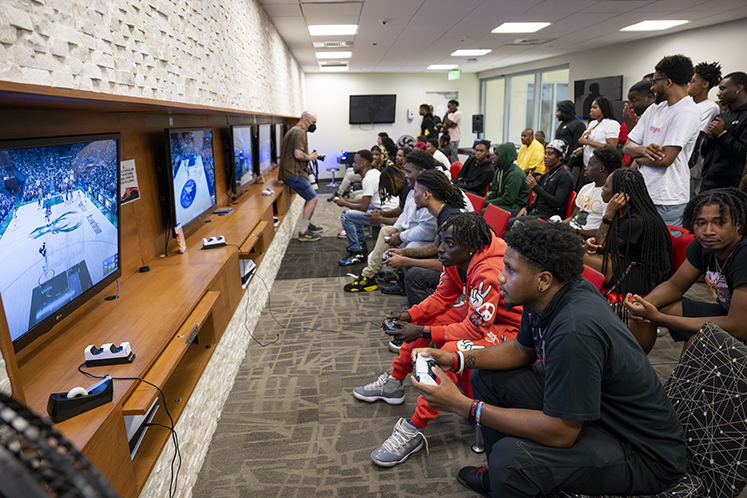Courtesy of Winston-Salem State University
Winston-Salem State University has received a $400,000 National Science Foundation (NSF) grant that will integrate esports into its HBCU computer science education program.
The grant was awarded to a WSSU research team led by Dr. Jinghua Zhang, a computer science professor, along with co-principal investigators, Dr. Mustafa Atay, computer science professor, and Dr. Rennae Stowe, associate professor of health, physical education and sport studies.
The award is from NSF’s Historically Black Colleges and Universities-Undergraduate Program and will support their project titled, “Enhancing Undergraduate Computer Science Education Through Esports,” an interdisciplinary initiative to enhance undergraduate computer science education, using the integration of esports as a tool for cultural expression and innovation.
Students compete in WSSU’s first esports competition in August 2023.
This project will help Winston-Salem State University improve computer science education, attract new underrepresented minority students to pursue a computer science degree, and help enrollment and retention of these students resulting in an increasing pool of qualified underrepresented minority graduates in science, technology, engineering and mathematics fields.
This initiative aligns with WSSU’s strategic priorities, which aim to support students in reaching their full potential through high-quality teaching and research. Infusing esports into computer science courses carries a host of broader impacts that extend far beyond the classroom, Zhang said. This innovative approach provides a gateway for underrepresented groups to explore computer science fields and has ripple effects on various aspects of their academic and professional lives.
“We are excited to receive this grant, which will enable the development of our esports lab,” Zhang said. “This initiative will enhance interdisciplinary collaboration and bring new energy to our computer science curriculum, allowing us to integrate esports-infused modules and provide students with hands-on experience in this fast-growing industry.”

One of the most significant impacts of this effort will be the increased representation of underrepresented minority students in STEM fields. Additionally, it will help bridge the achievement gap in STEM subjects among underrepresented minority students by providing a more engaging way to learn complex concepts and fostering a sense of confidence in these areas. Beyond education, the integration of esports introduces students to a wide range of career opportunities within the growing esports industry.
Infusing esports into computer science education has the potential to empower underrepresented minority students to explore their passions, develop essential skills and envision themselves in STEM careers, ultimately contributing to a more diverse and innovative STEM landscape.
For more information, email Dr. Jinghua Zhang at zhangji@wssu.edu.
About HBCU-UP: The Historically Black Colleges and Universities-Undergraduate Program (HBCU-UP) through Targeted Infusion Projects supports the development, implementation, and study of evidence-based, innovative models and approaches for improving the preparation and success of HBCU undergraduate students so that they may pursue science, technology, engineering, or mathematics (STEM) graduate programs and/or careers.
